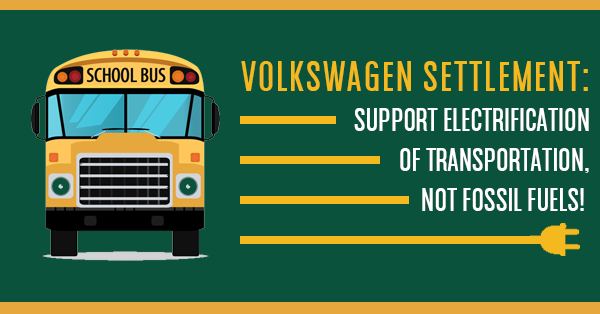Over the past year, VPIRG has been working to ensure that the $18.7 million Vermont will be receiving as part of the settlement on the Volkswagen emissions cheating scandal. Last week, that work started to pay off.
After the Scott Administration, and Governor Scott himself, made clear that they intended to spend a significant portion of the settlement money on fossil fuel vehicles, VPIRG and our members urged the legislature to require it be spent on electric transportation instead – in particular electric school buses.
This past legislative session, the legislature included language in the budget that did just that for the portion of the money to be spent over the next year. And while the budget has not yet been signed by Governor Scott, it appears clear that this portion of the budget will remain unchanged as negotiations continue on the larger issues.
Then, early last week, the Department of Environmental Conservation (DEC) , which had been modified to comply with the language in the budget. In it, they laid out three specific goals. First, reduce health-impacting NOx emissions. Second, demonstrate the feasibility of electrifying our vehicles. Third, maximize the public and private investment in EV charging stations.
Of this $18.7 million, a total of $1.8 million is available for FY19 which will be primarily invested in an electric bus pilot program (more on that below). Vermont’s EV charging infrastructure will also receive 15% of the total $18.7 million. This equates to about $2.8 million for building light-duty electric vehicle charging stations throughout the state for both the private and public sector.
Securing over $4 million for electrification is an important step to reach our greenhouse gas reductions goals, but our job is not done. The plan makes clear that the other 70% of the money can still be spent on diesel and other fossil fuel vehicles, at a time when we need to be moving away from fossil fuels as quickly as possible.
While some of that 70% could be spent on electrification (like 24% set aside for more buses, after the initial pilot), leaving the door open even a crack for more fossil fuel infrastructure to be purchased with these settlement funds is an unacceptable outcome. That’s why we’ll be urging the legislature next year to finish the job and require all $18.7 million to be spent on electric transportation.
In the meantime, this summer you can play an important role by helping your local school district get access to the funds to invest in electric school busses. If you’re on a school board, select board, PTA, or other entity that may be interested in being involved in an application, let us know! And if you’re not, give your local school board a heads up that this opportunity is coming up later this summer and urge them to apply for funding.
Around the beginning of July, DEC will issue a request for proposals. This is when your school district can apply for funding and describe the need for these busses in your community. DEC will select applicants based on multiple factors including project feasibility, level of NOx, carbon, and other pollution reductions, and ease of implementation.
For more information about the process and timeline of events, visit the ANR Department of Environmental Conservation website. – and sign up on our email list, as we’ll be keeping our members and supporters in the loop as well.
The Vermont Energy Investment Corporation (VEIC) also has some great resources on their site, and if you really want to sink your teeth into electric bus research, check out this report Environment America recently came out with.

